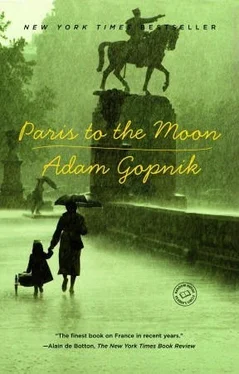Juppe would probably have been able to survive the revelation of his living arrangements if only Le Canard Enchame hadn’t published, a couple of Wednesdays later, the news that when Juppe was a city official, he had taken apartments in the domaine privé for his son and daughter as well and that these apartments too were right there on the rue Jacob. Then it turned out that both Juppes ex-wife and his half brother had apartments courtesy of the City of Paris. (The former Mme. Juppe was lodged across the river, on the Right Bank, presumably out of deference to the sensibilities of the new Mme. Juppe.) At this point l’affaire des logements became a little more serious. Le Canard published a document apparently showing that Juppe had approved a rent reduction on his son’s apartment from seven thousand francs per month to six thousand (a difference of about two hundred dollars). This might have contravened an all-purpose law against ethical backsliding on the part of public officials, a law whose worst penalty, sweetly enough, was that the offender would be prohibited from ever again being elected to office.
Things got so bad that Juppe had to submit to a humiliation that the French had previously considered fit only for American politicians. He had to go on television and answer questions from reporters. (De Gaulle spoke directly to the French people or else in highly choreographed press conferences; Mitterrand would tolerate a few friendly journalists but would explain to them why the questions they were asking were not of a standard that could decently be put to the president of the republic.) Juppe, by contrast, had to give one of those jumpy, undignified, I-have-nothing-to-hide performances beloved of American handlers.
Juppe did his best. He pointed out that members of the French press had been around for dinner at the now-famous apartment on the rue Jacob, and nobody had seemed upset about the apartment then. (This argument was regarded as fighting dirty. The next day Le Monde haughtily noted that it was not proper for guests to ask their host how much he paid in rent and who owned his apartment.) Juppe also announced that he had lowered the rent on his son’s apartment only because he was afraid of contributing to a general inflation of rents in the city. It didn’t help much. In July a local lawyer with Socialist party connections began filing letters of complaint against Juppe with the state district attorney in Paris, Bruno Cotte, who would therefore have to decide whether to go the Italian route and indict the prime minister of France (and, not incidentally, launch his own political career) or go the honored French route and let it all pass.
By this time I had come into possession of what I thought was the lease on an apartment and so found the later stages of I’affaire des logements very diverting. There is nothing like being even an honorary, part-time insider to make insiderness look cute. Then, just as we were about to leave Paris to go home and collect our furniture, I got a call from the real estate agent. “I have bad news,” she announced. “Your apartment is off the market. She made it sound as though the apartment had won a prize.
Things worked out better for us than they did for the prime minister. We came back to Paris at the end of September and managed, through various routes, to find an apartment at 16 rue du Pre-aux-Clercs in the Seventh Arrondissement. The story with this one was that it belonged to a young man who had just been posted by his bank to Tokyo; the apartment was affordable because he and his wife had left it half renovated and half a wreck. On the other hand, they would want the apartment back when they returned from Japan, at some unspecified date, which makes us leap every time the doorbell rings.
Bruno Cotte has at last offered his judgment on the Juppe case. He declared that he would not indict Juppe for what he had done with the domaine prive apartments, provided that the prime minister of France get out of his apartment and rent one someplace else. This may have been a first in the history of jurisprudence: an eviction notice issued by a magistrate against the prime minister of a major Western power. “This was more cruel than an indictment, which at least had the savor of persecution,” a veteran Parisian journalist said to me of the Cotte verdict. “An indictment might have been insupportable, but an eviction is merely ridiculous.”
Naturally, American and British journalists have tried to analyze l’affaire des logements and, interpreting it in the light of Anglo-American politics, have concluded that Juppe has suffered because he was seen as a member of an unduly privileged elite. This is in fact almost the direct opposite of the truth. The Frenchmen who are currently the most enraged at the government—the functionaries who stopped all business in Paris several weeks ago—are not protesting against the accumulated perks of a privileged class. They are the privileged class, protesting on behalf of their accumulated perks. What made them mad about I’affaire des logements, and Juppe’s conduct, was not that it revealed to them something they hadn’t known but that it reminded them of something they knew all too well—namely, that the system of acquis sociaux —entitlements—runs so deep in France that to abolish it would be in some sense to abolish French life itself. Every Frenchman who is not outright destitute sits in the middle of a domaine prive— that is, within a domain of private benefits that he enjoys by virtue of his place in civil society The triumph of the Fifth Republic was to have expanded that domain so that it included nearly everybody But it may no longer be capable of any expansion at all. The people who are left outside now seem to be left outside for good. The North African immigrants, in particular, who fill the Paris banlieue that the police have largely abandoned are not just a minority; they are without any entree at all. They are called, simply, the excluded. Some of them set bombs off under your bed.
Juppe’s serenity is certainly gone for good. Already he is speaking plaintively of his fate. “But why have they done this to me? I am honest!” he told an interviewer recently. “Had I known, when I was foreign minister I could have moved to the quai d’Orsay, where I would have had at my disposal two hundred and eighty square meters and a chambermaid, and nobody would have reproached me at all.” People agreed that he had a point, but they also noticed the way he was able to rattle off the square meters by heart.
After brooding on this affair, the French elite has decided that the cure for the kinds of hidden deals that fill French public life is transparence, which has become (along with exclusion) the word of the moment here. By transparence people just mean that everybody should see everything that is going on. A lot of Parisians would now settle for having a Paris that is transparent the way an ant farm is transparent: with a cutaway front so that you can see the action even if you can’t affect it. But what has always given Paris its peculiar grace and favor is that things that are hidden away elsewhere (like, say, adulteries) are all out in the open here, while things that are all out in the open elsewhere are hidden away here (like, say, the way you get an apartment). A Pans you can see right through hardly seems worth having.
The “generalized” strike that the big French labor federations have called—making a fastidious distinction between what they’re doing now and the “general” strike that they may yet get around to—has shut down Paris. The commuter and intercity trains haven’t run for two weeks, not even the TGV, the famous fast train between Paris and the South. The Metro is closed down (the crickets who live beneath the rails are said to be perishing for lack of the heat they normally get from the friction of the trains running above, and their plight has become a minor cause celebre here). There are no buses, and the post office has stopped delivering the mail. Even le Paris touristique has been snapped shut. The Ritz has had a dropoff in occupancy of 25 percent (at the height of the terrorist bombing campaign, a few months ago, the rate was near normal, which suggests that the rich would rather risk being blown to bits than have a hard time finding a taxi). The Louvre, like a city under siege, has been struggling to stay open and can guarantee only a narrow access corridor, leading directly from the entrance to the Mona Lisa. The government has even commandeered the bateaux-mouches— those ugly, flat-bottomed open-air tourist boats that ply the tourist sights year-round—and has turned them into ferryboats to get commuters up and down the Seine.
Читать дальше












